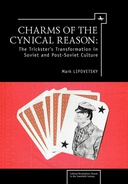Explore
The impetus for Charms of the Cynical Reason is the phenomenal and little-explored popularity of various tricksters flourishing in official and unofficial Soviet culture, as well as in the post-Soviet era. Mark Lipovetsky interprets this puzzling phenomenon through analysis of the most remarkable and fascinating literary and cinematic images of soviet and post-Soviet tricksters, including such “cultural idioms” as Ostap Bender, Buratino, Vasilii Tyorkin, Stierlitz, and others. Soviet tricksters present survival in a cynical, contradictory, and inadequate world, not as a necessity, but as a field for creativity, play, and freedom. Through an analysis of the representation of tricksters in Soviet and post-Soviet culture, Lipovetsky attempts to draw a virtual map of the soviet and post-Soviet cynical reason: to identify its symbols, discourses, and contradictions, and by these means its historical development from the 1920s to the 2000s.
This book is included in DOAB.
Why read this book? Have your say.
You must be logged in to comment.
Rights Information
Are you the author or publisher of this work? If so, you can claim it as yours by registering as an Unglue.it rights holder.Downloads
This work has been downloaded 469 times via unglue.it ebook links.
- 220 - pdf (CC BY-NC) at Unglue.it.
- 249 - pdf (CC BY-NC) at static1.squarespace.com.
Keywords
- History
- History and criticism
- KUnlatched
- Literary Criticism
- Literary Criticism / Russian & Former Soviet Union
- Literature
- Literature and society
- Motion pictures
- Postmodern Russia
- Russian cinema
- Russian fiction
- Soviet culture
- Soviet studies
- Tricksters in literature
- Tricksters in motion pictures
Editions

